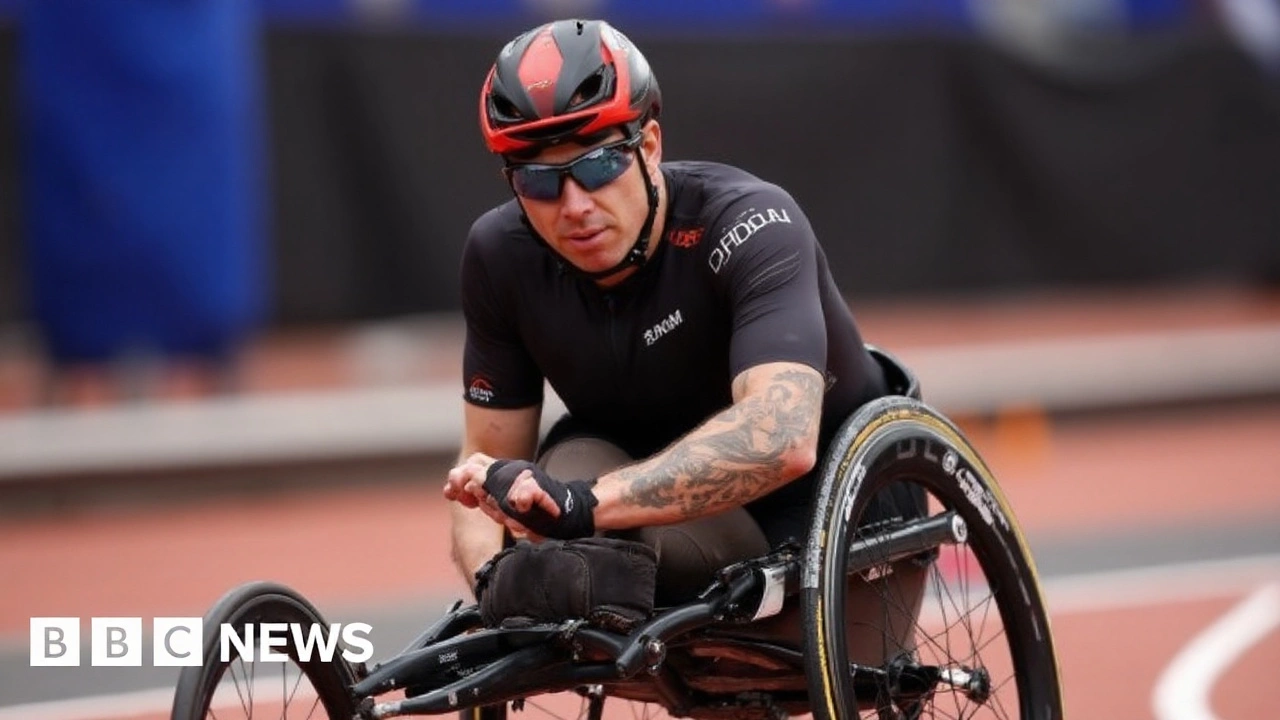
David Weir steps back from Great Britain duty after Paris 2024
Six Paralympic titles. Eight London Marathon wins. Nearly three decades at the top. After finishing fifth in the men’s T54 marathon at the Paris 2024 Games, David Weir has called time on his international career for Great Britain. At 45, he says he will keep racing the big city marathons, but he’s done with wearing the GB vest.
Weir’s résumé is as heavy as they come. He owns 10 Paralympic medals, including six golds, and he lit up London 2012 with a clean sweep of four titles that turned him from elite athlete into a household name. Fans nicknamed him the “Weirwolf” for a reason: he raced with bite, and he kept doing it year after year.
Paris was different. Not a farewell medal, but a hard, honest fifth in a stacked T54 field. That’s the top wheelchair racing class for athletes with full arm function and limited or no leg function. The marathon demands high speed, tactics, and arm power over 42.2km—on busy streets, over cobbles, in wind and heat. It’s brutal. A top-five finish at that level at his age says plenty about his staying power.
He first lined up at the Paralympic Games in Atlanta in 1996, when wheelchair racing looked and felt very different. Equipment has evolved from heavier, less aerodynamic chairs to today’s rigid frames and responsive carbon wheels. Training is more scientific, race strategies are sharper, and the global field is deeper. Weir adapted with the times and stayed relevant long after most of his early rivals had retired.
London 2012 was his high point. Four golds on home roads—track and marathon—put him in the select group of British athletes who defined those Games. The public embraced wheelchair racing like never before, and Weir’s success helped drive that surge in attention. He kept the spotlight burning in the years after, stacking up eight London Marathon victories and turning that race into a kind of second home.
His Paris decision is specific: he’s stepping away from international representation. That means no more Paralympics or World Championships for Great Britain. It does not mean he’s done. He plans to keep racing major marathons, where the fields are deep, the courses fast, and the rivalries fierce. If you’ve followed men’s wheelchair marathons over the last decade, you know the level—split-second sprints, tactical surges, and front-wheel duels down the finishing straight.
Why keep going? Because the big city races still offer what he loves: competition, crowds, and a clear clock. The marathon scene has its own season rhythm, and athletes can build around a few peaks instead of the four-year Paralympic cycle. That freedom suits veterans who know their bodies and want to pick their battles.
The numbers tell a story of consistency and reinvention. Ten Paralympic medals across multiple Games. Six of them gold. Eight wins in London against a field that keeps getting stronger. The nickname may be punchy, but it’s the longevity that stands out. Very few elites in any sport sustain that output from their teens into their mid-40s.
What about the talk of a move to Sussex? We checked the available information and could not find reliable sources confirming that. No official statements, no verified announcements. What’s on record is simple: retirement from Great Britain duty and an intention to continue on the major marathon circuit. Anything beyond that is speculation for now.
His exit from the GB setup opens space for emerging British racers. The pipeline is healthier than it used to be, with better equipment access, more race opportunities, and a clearer pathway from junior to elite. That’s part of Weir’s impact, too. His results raised expectations and helped bring in attention and sponsorship to the sport in the UK.
The Paris marathon itself underscored how demanding the event remains. On a course that punished mistakes, Weir stayed in the fight and finished inside the top five. At this level, one mistimed surge or a gust of wind at the wrong moment can be the difference between a medal and missing the podium. He’s lived through the razor’s edge of that calculus more times than most.
There’s also a personal layer here: ending the national-team chapter doesn’t erase the pride that comes with it. From Atlanta to London, Rio, Tokyo, and Paris, every cycle asks for sacrifice—time away from family, relentless training, and the pressure of selection. Choosing when to close the door is as much about control as it is about results.
As for legacy, it stretches beyond medals. Weir made wheelchair racing part of mainstream British sport conversations. He turned tactical acumen—when to draft, when to attack on a downhill, when to gamble on a break—into prime-time viewing. He showed that endurance and race craft can beat younger arms on the right day.
What comes next—and what we know (and don’t) about Sussex
Expect to see him on start lines where the world’s best gather: the big, televised marathons that anchor the calendar. He knows those courses, and those races know him. A lighter schedule could sharpen his focus and extend his years at the top end of the field.
On the Sussex question, here’s the bottom line. There’s no verified confirmation he’s moving there. If that changes, it will come from him or from sources you can clearly trust. Until then, the only firm updates are about his race plans and the end of his Great Britain chapter.
However the next season shapes up, the outline is clear: the national anthem era is over, the open-road era continues. For fans who watched him sprint down The Mall, attack over London’s Embankment, and grind through Paralympic laps, there’s still more racing to follow—just without the Team GB kit.